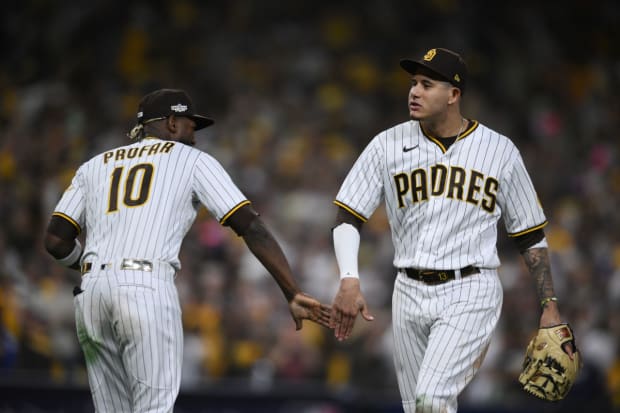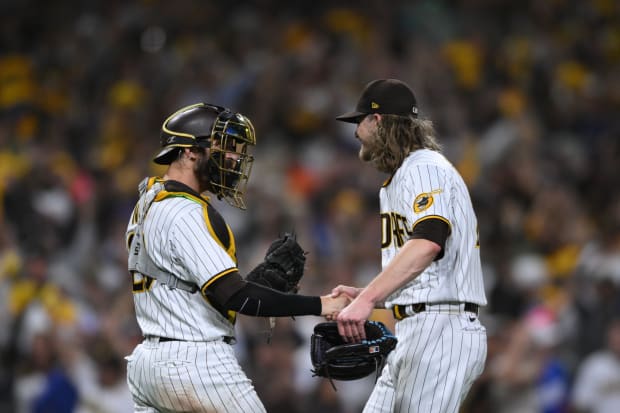SAN DIEGO – A second year into his tenure as general manager of the Padres, A.J. Preller found himself in the northeastern Mexican state of Coahuila in 2015 intrigued by a pitcher playing his first season of professional baseball at age 24. Robert Suárez had left his home in Venezuela—not to mention his construction job and semipro team there—to make a little money pitching in the Mexican League for the Saraperos de Saltillo.
“I tried to sign him,” Preller says, “but he was an international free agent and I only had something like $200,000 or $300,000 of international signing money left.”
There was another hitch: the SoftBank Hawks of Japan offered Suárez more money. Much more money.
“SoftBank has money to spend,” Preller says. “They offered him something like seven years and $7 million. I tried to tell him in the long run, signing with a major league organization would be best. He signed with them. I completely understood.”
Six years, one elbow surgery, one release and one big season as a closer later, Suárez finally agreed to sign with Preller and the Padres last Dec. 1—just hours after Preller signed Luis García, a reliever from the Dominican Republic who was turning 35, had been released twice and would be pitching for his eighth organization.
“We were the only ones in on Suárez,” Preller says.

Orlando Ramirez/USA TODAY Sports
Such moves that almost no one noticed right before the lockout are part of the reasons why the Dodgers and their 111 wins—the fourth most ever—are on the brink of becoming a footnote. The Padres won NLDS Game 3 Friday night, 2–1, with another impressive display of baseball at its cleanest, especially when it comes to relief pitching.
The mighty Dodgers have done nothing against the San Diego ‘pen, an assemblage of power arms from around the globe. Padres relievers have obtained 39 outs in this series without allowing a run to cross the plate. They have permitted the highest-scoring team in baseball five hits over 13 shutout innings.
Between a stout Blake Snell starting and a revitalized Josh Hader closing, the Padres built a bridge with a converted Fordham infielder, the erstwhile construction hand from Venezuela and the mid-30s journeyman. It held like reinforced steel to get the ball to Hader.
“That’s relief pitching these days,” says Preller. “You find it wherever you can.”
Preller signed Nick Martinez, the former Fordham Ram who had been pitching in Japan, just after the lockout ended (four years, $25.5 million), on the heels of the $11 million deal over two years for Suárez (the second, a player option) and the $7 million for two years for García.
Suárez hasn’t allowed a run since August. Over the final three innings, García, Suárez and Hader threw 16 pitches at 99 miles per hour or more.
And yet they have such nasty sliders, too, that Dodgers manager Dave Roberts, fishing for reasons why his team can’t dent the San Diego bullpen, said, “They’re getting us with spin. They’re getting us on the outside part of the plate. We’re not given really any opportunities to [hit] mistakes, and that’s more specific to the ‘pen.”

Orlando Ramirez/USA TODAY Sports
In every phase, the Padres have played smarter, more aggressive baseball. Dodgers shortstop Trea Turner has cost the Dodgers with his skittish play. In Game 2 his error on a routine grounder led to a critical run. He escaped more infamy when a run did not score with the boneheaded decision to throw to second base for a third out when the runner on first, Trent Grisham, was fast and not being held on—while the batter running to first was Austin Nola, the San Diego catcher. Grisham beat the throw.
In Game 3, Turner was indecisive on a routine grounder with an out at second base on a force; he recovered, awkwardly, to get the out. He also dropped a popup he had no business trying to catch; it was a much easier play for incoming left fielder Chris Taylor.
And when Turner began the eighth inning with a single off Suárez, he inexplicably did not attempt to steal second base over the course of the 10 pitches that followed. Turner is one of the fastest baserunners and has a career stolen base success rate of 85%. The moment called for a bold move, especially because waiting to string together hits against the San Diego relievers has long been established to be a lousy strategy. Worse, upon nearly being picked off by Suárez, Turner jammed his right ring finger so badly he was being sent for x-rays to see if he broke it.
The Dodger troubles mounted in Game 3. Starting pitcher Tony Gonsolin, having thrown two innings in the previous 52 days, lasted nine batters, before the blatant rust in his pitching required relief help. Justin Turner is late on fastballs. Chris Taylor, who everybody erroneously wanted to face Hader in Game 2 instead of Austin Barnes, showed his own rust in his first start in two weeks, during which he received a cortisone shot in his stiff neck. (Ouch.)
In one delicious bit of theatre, when the lineup turned over a third time against Snell— starting with Mookie Betts—the Dodgers faced the same intersection they did in 2020 World Series Game 6. In the first instance, Rays manager Kevin Cash assisted the Dodgers by removing Snell; the Dodgers promptly came from behind against the Tampa Bay bullpen to win.
This time, Snell’s manager not only left Snell in to pitch to Betts a third time—with runners at second and third with no outs in the fifth—but he also allowed Snell to pitch to Trea Turner and Freddie Freeman a third time—$70.92 million worth of star power this year alone.
“But he was still explosive, and they weren't hitting him,” Padres manager Bob Melvin said about Snell, without quoting any data. Imagine that. “I was going to give him a little rope there.”
Snell rewarded his manager’s faith by retiring all three stars, with one run scoring on a Betts fly ball. He even obtained one more out the next inning before Preller’s ‘pen—four relief pitchers he acquired over the past 10 months—kept throwing goose eggs, the appropriate metaphor given the greater white-fronted goose that interrupted Game 2. Since the goose landed in the eighth inning of that game, the Padres have held the lead after the end of every inning.
The news doesn’t get any better for Los Angeles. To keep their season alive, the Dodgers must get through Joe Musgrove, the Padres’ hottest pitcher.
“We’ve got our hands full tomorrow,” Roberts said. “Musgrove is coming off a great start. We’ve seen him a lot. We’re going to have to compete and have good at bats and hopefully get to the ‘pen somehow.”
Roberts’s choice of words spoke as loudly as the Petco Park fans, who for the first time since the ballpark opened in 2004 got to see in person their Padres win a postseason game at home. “Hopefully” and “somehow” have become the operative words for a Dodgers team that once was chasing teams such as the 1927 and ’98 Yankees among the best ever. Now they are in danger of joining the company of the 1906 Cubs, who based on winning percentage, suffered the biggest upset in postseason history by losing the World Series to the White Sox. This would be the second biggest upset.
To borrow a word, “somehow” it doesn’t feel like a potential upset that monumental. The Padres have been the better team, especially whenever the bullpen door opens.







